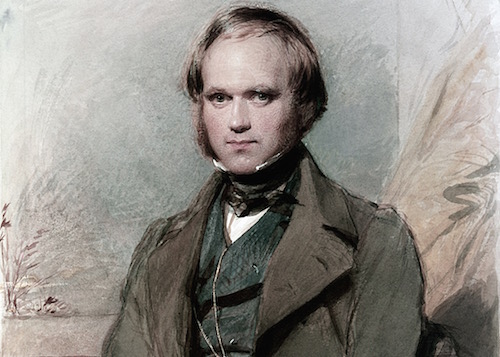 Evolution
Evolution
 Intelligent Design
Intelligent Design
A Disney Darwin Is Coming

There’s already an element of the fairy tale in the beguiling Darwinian story of evolution, so perhaps a Disney Darwin isn’t all that shocking an idea. It’s evidently on the way, according to the Independent, “Charles Darwin Disney film: Adventure movie will give naturalist the Indiana Jones treatment.”
Charles Darwin looks set to be given the Indiana Jones treatment after Disney bought the rights to an adventure film based on his life.
….
The Oscar-winning writer of Traffic, Stephen Gaghan, who also wrote and directed George Clooney film Syriana, is behind the project.
…
The project is in its earliest stages and few details have been released, but it is likely to cover Darwin’s five years aboard HMS Beagle, which set out in 1831 around South America, to Australia and South Africa.
David Norman, Odell fellow in the natural sciences at Christ’s College, Cambridge, said a portrayal of Darwin as an adventurer was not far-fetched. “If you look at the records of him as a young man he was a strong, powerful, athletic and a bit of a daredevil.”
Wait a minute. Disney perhaps. But Indiana Jones? That is absolutely ridiculous. They seem to have the wrong one of the two co-discoverers of the theory of evolution. For a character worthy of Harrison Ford, surely it’s Alfred Russel Wallace that you want, not Darwin. You know, the same Alfred Wallace who realized that undirected natural forces alone were insufficient to account for the development of complex life, including the human mind, and ultimately drew a conclusion similar to that of modern intelligent-design theorists.
Of course Disney has always excelled at fantasy and comedy, and this is surely both. Here we have a man who skirted the coast of various continents for a few years with Captain Fitzroy versus a man who lived literally by his wits with native peoples in South America and throughout the Malay Archipelago. The juxtaposition is a simple one, and readily quantifiable. Wallace spent twelve years in the field (April 1848 to October 1852 in the Amazon, March 1854 to spring of 1862 in the East), Darwin only five (December 1831 to October 1836).
Here’s a relevant passage from a terrific book by our colleague Professor Michael Flannery, Alfred Russel Wallace’s Theory of Intelligent Evolution: How Wallace’s World of Life Challenged Darwinism (pp. 45-46):
Although everyone remembers Darwin, Wallace was perhaps the 19th century’s greatest naturalist. He had 12 years of ?eld experience, more than twice that of Darwin. From watching exotic parrots in South America to marveling at the orangutan of Borneo, Wallace came to see a deep and abiding design in many features of nature. When he observed and lived among natives, whether along the banks of the Amazon or on the islands of Malaysia, he saw human beings with the same innate capacities as himself. In contrast Darwin was horri?ed by the natives of Tierra del Fuego and thought them closer to animals than men. Wallace had a more intimate and therefore deeper appreciation of indigenous cultures. Among the Dyak headhunters of Borneo Wallace noted that, aside from ritualistic violence, tribal crime was almost unheard of. Even a tribesman from the Uaup�s River of South America could learn civilized re?nements if exposed to them and taught them early on. Higher re?nements were not absent in aboriginals they were innate. In the end the very different reactions between Darwin and Wallace to the “uncivilized” translated into two radically different views of humanity. Darwin saw man a little above the beasts; Wallace saw man a little below the angels. This is more than a poetic nicety. It shows that Wallace (unlike Darwin) looked behind the apparent. Perhaps Darwin would have understood better if he too had actually lived among the people he observed instead of swooning aghast at their behavior like some rich tourist on holiday (which in many ways he was). But that might mean abandoning his preconceived worldview.
Make that a rich tourist financed by Dad. Darwin’s voyage on The Beagle was paid for by his father (around 600 pounds worth). By custom the ship’s senior surgeon, Robert McCormick, should have been the expedition’s naturalist. Darwin’s official duty was not as the ship’s naturalist. From the beginning of the voyage, the notion that Darwin was the Beagle’s naturalist existed only in his own mind. Disagreements between McCormick and Darwin would ultimately have the surgeon leave the expedition in a huff.
FitzRoy, after McCormick’s departure, basically allowed the official collection he had ordered to take second place to Darwin’s. “Darwin,” FitzRoy rumbled darkly in post-Beagle days, “should not forget the generosity extended to him by captain and crew alike. It seems only too evident, however, that he did” (Janet Browne, Voyaging, p. 227). Does this sound anything like an Indiana Jones?
In contrast, Wallace, by and large, paid his own way with the specimens he collected and sent off to his agent Samuel Stevens back in England. For Darwin, collecting was a fascination underwritten by his father, Dr. Robert Darwin. For Wallace collecting was a passion and a livelihood fueled by his own hard work.
How many specimens did Wallace bring home? In the East alone, 310 species of mammals, 100 reptiles, 8,050 birds, 7,500 shells, 13,100 lepidoptera (butterflies), 83,200 coleoptera (beetles), 13,400 “other insects.” Total: 125,660. This excludes species collected in South America, many of which were lost in a shipwreck.
Darwin amassed nothing approaching this. Wallace’s massive collecting reflects a man in need of an income — no specimens meant no sales. Darwin’s comparatively smaller scale collecting reflect the interests of hobbyist with the leisure of an independent income. Which do you think represents the more independent adventurous spirit?
For the amazing and genuine adventure story that is Alfred Wallace’s life, see Michael Flannery’s outstanding short biography, Alfred Russel Wallace: A Rediscovered Life.
Image: Charles Darwin as a young man, by George Richmond [Public domain], via Wikimedia Commons.
